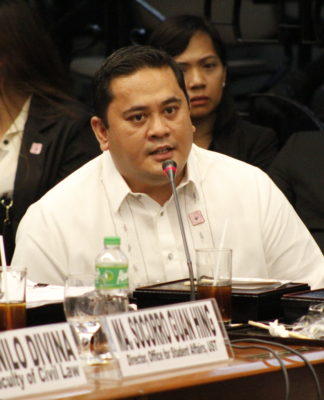July 15, 2015, 6:53 a.m. – THE CATHOLIC Bishops’
Conference of the Philippines (CBCP) is urging the government to ensure that
college professors keep their jobs during the transition period of the K to 12
program in 2016.
Archbishop Socrates Villegas, CBCP president, asked
government agencies, schools, and parents to maintain an “attitude of openness
and respect” in dealing with the K to 12 program in the pastoral letter
“Advancing in wisdom and favor before God and man” released Tuesday.
“We call on schools in a given territory or region to
discuss the years of ‘no enrollment’ in college and see how best to cope with
this reality,” Villegas said, adding that “no one should suffer in the implementation
of the program.”
A study by the Commission on Higher Education and the
Department of Labor and Employment showed that an estimated 85,000 higher
education institution employees would be at risk of losing their jobs once the
K to 12 program goes in full swing.
“Teachers are not to be considered just as expenses but as
partners in the noble mission of education. May this not lead to the contractualization
of the teaching personnel,” Villegas said.
Parents should also be involved in discussions on the K to
12 program to reduce “anxieties and resistance” during the transition period.
“School and education officials must be ready and capable to discuss it with
parents, even the students themselves in an atmosphere of loving dialogue,” he
said.
A group of parents known as the Parents Advocacy for
Children’s Education brought a petition before the Supreme Court last May to
suspend the K to 12 program, citing lack of consultations.
The newly reelected CBCP president also raised the
likelihood of some students dropping out of school because of poverty.
“The K to 12 program provides skills and competencies for
the poor who may not have access to college education. Employment is no longer
the privilege of the college graduate. Rather, through the senior high school
program with its varied “trackings” and the academe – industry linkage, the K
to 12 graduate at age 18 can enter the work force,” Villegas said.
“This is a big help to the poor! Realistically though we
know that there will be many students who will drop out of the whole program.
There should be means to help out these dropouts. We do not yet see this issue
being addressed in the program,” he added.
The K to 12 program will add two years of secondary
education beginning 2016. Next year, high school students will enroll in Grade
11 instead of graduating to college, which will result in the loss of college
freshmen. There will also be few second-year college students in 2017 when
Grade 11 students go to Grade 12. Daryl Angelo P. Baybado

















